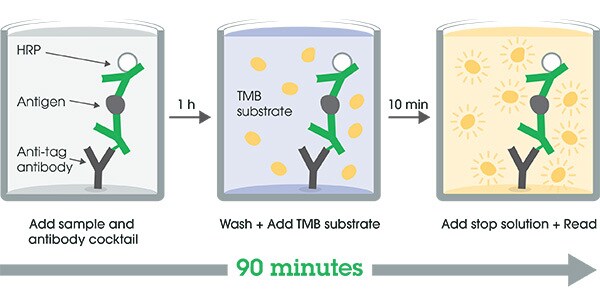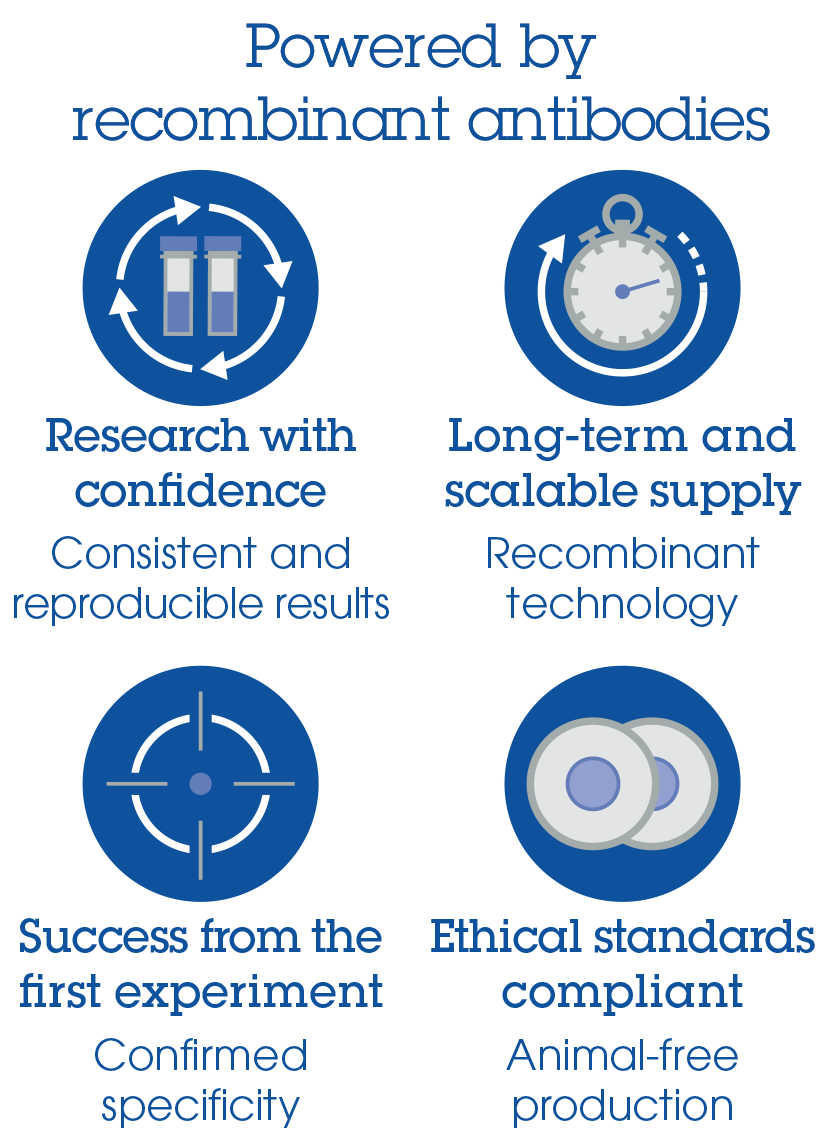Human SIRP alpha ELISA Kit (CD172a) (ab272477)
Key features and details
- One-wash 90 minute protocol
- Sensitivity: 76.9 pg/ml
- Range: 156.25 pg/ml - 10000 pg/ml
- Sample type: Cell Lysate, Tissue Extracts
- Detection method: Colorimetric
- Assay type: Sandwich (quantitative)
- Reacts with: Human
Overview
-
Product name
Human SIRP alpha ELISA Kit (CD172a)
See all SIRP alpha kits -
Detection method
Colorimetric -
Precision
Intra-assay Sample n Mean SD CV% extract 8 2.5% Inter-assay Sample n Mean SD CV% extract 3 5.2% -
Sample type
Tissue Extracts, Cell Lysate -
Assay type
Sandwich (quantitative) -
Sensitivity
76.9 pg/ml -
Range
156.25 pg/ml - 10000 pg/ml -
Recovery
Sample specific recovery Sample type Average % Range Tissue Extracts 88 87% - 90% Cell Lysate 99 91% - 105% -
Assay time
1h 30m -
Assay duration
One step assay -
Species reactivity
Reacts with: Human -
Product overview
Human SIRP ELISA kit (ab272477) is a single-wash 90 min sandwich ELISA designed for the quantitative measurement of Human SIRP protein in cell and tissue extracts. It uses our proprietary SimpleStep ELISA® technology. Quantitate Human SIRP with 76.90 pg/mL sensitivity.
SimpleStep ELISA® technology employs capture antibodies conjugated to an affinity tag that is recognized by the monoclonal antibody used to coat our SimpleStep ELISA® plates. This approach to sandwich ELISA allows the formation of the antibody-analyte sandwich complex in a single step, significantly reducing assay time. See the SimpleStep ELISA® protocol summary in the image section for further details. Our SimpleStep ELISA® technology provides several benefits:
-Single-wash protocol reduces assay time to 90 minutes or less
-High sensitivity, specificity and reproducibility from superior antibodies
-Fully validated in biological samples
-96-wells plate breakable into 12 x 8 wells strips
A 384-well SimpleStep ELISA® microplate (ab203359) is available to use as an alternative to the 96-well microplate provided with SimpleStep ELISA® kits.
-
Notes
SIRP alpha (SIPRA or CD127a) is a 37.73 kD immunoglobulin-like cell surface receptor for CD47. SIRP alpha is involved in the negative regulation of receptor tyrosine kinase-coupled cellular responses induced by cell adhesion, growth factors, or insulin. SIRP alpha may play a key role in intracellular signaling during synaptogenesis and in synaptic function (By similarity.) The antibodies are designed to a fragment of the extracellular domain of SIRP alpha.
Abcam has not and does not intend to apply for the REACH Authorisation of customers’ uses of products that contain European Authorisation list (Annex XIV) substances.
It is the responsibility of our customers to check the necessity of application of REACH Authorisation, and any other relevant authorisations, for their intended uses. -
Platform
Pre-coated microplate (12 x 8 well strips)
Properties
-
Storage instructions
Store at +4°C. Please refer to protocols. -
Components 1 x 96 tests 10X Human SIRP alpha (CD172a) Capture Antibody 1 x 600µl 10X Human SIRP alpha (CD172a) Detector Antibody 1 x 600µl 10X Wash Buffer PT (ab206977) 1 x 20ml 50X Cell Extraction Enhancer Solution (ab193971) 1 x 1ml 5X Cell Extraction Buffer PTR (ab193970) 1 x 10ml Antibody Diluent 4BI 1 x 6ml Human SIRP alpha (CD172a) Lyophilized Recombinant Protein 2 vials Plate Seals 1 unit Sample Diluent NS (ab193972) 1 x 12ml SimpleStep Pre-Coated 96-Well Microplate (ab206978) 1 unit Stop Solution 1 x 12ml TMB Development Solution 1 x 12ml -
Research areas
-
Function
Immunoglobulin-like cell surface receptor for CD47. Acts as docking protein and induces translocation of PTPN6, PTPN11 and other binding partners from the cytosol to the plasma membrane. Supports adhesion of cerebellar neurons, neurite outgrowth and glial cell attachment. May play a key role in intracellular signaling during synaptogenesis and in synaptic function (By similarity). Involved in the negative regulation of receptor tyrosine kinase-coupled cellular responses induced by cell adhesion, growth factors or insulin. Mediates negative regulation of phagocytosis, mast cell activation and dendritic cell activation. CD47 binding prevents maturation of immature dendritic cells and inhibits cytokine production by mature dendritic cells. -
Tissue specificity
Ubiquitous. Highly expressed in brain. Detected on myeloid cells, but not T-cells. Detected at lower levels in heart, placenta, lung, testis, ovary, colon, liver, small intestine, prostate, spleen, kidney, skeletal muscle and pancreas. -
Sequence similarities
Contains 2 Ig-like C1-type (immunoglobulin-like) domains.
Contains 1 Ig-like V-type (immunoglobulin-like) domain. -
Post-translational
modificationsN-glycosylated.
Phosphorylated on tyrosine residues in response to stimulation with EGF, growth hormone, insulin and PDGF. Dephosphorylated by PTPN11. -
Cellular localization
Membrane. - Information by UniProt
-
Alternative names
- Signal regulatory protein alpha type 1
- Bit
- Brain Ig like molecule with tyrosine based activation motifs
see all -
Database links
- Entrez Gene: 140885 Human
- Omim: 602461 Human
- SwissProt: P78324 Human
- Unigene: 581021 Human
Images
-
based on a 250 μg/mL extract load, SH-SY5Y cell extract based on a 2,000 μg/mL extract load, and brain tissue extract based on a 10 μg/mL extract load The concentrations of SIRP alpha were measured in duplicate and interpolated from the SIRP alpha standard curve and corrected for sample dilution. The interpolated dilution factor corrected values are plotted (mean +/- SD, n=2). The mean SIRP alpha concentration was determined to be 7.08 ng/mL in U-937 extract and 3.03 ng/mL in SH-SY5Y extract, and 6.85 ng/mL in brain extract.
-
-
SimpleStep ELISA technology allows the formation of the antibody-antigen complex in one single step, reducing assay time to 90 minutes. Add samples or standards and antibody mix to wells all at once, incubate, wash, and add your final substrate. See protocol for a detailed step-by-step guide.
-
To learn more about the advantages of recombinant antibodies see here.














